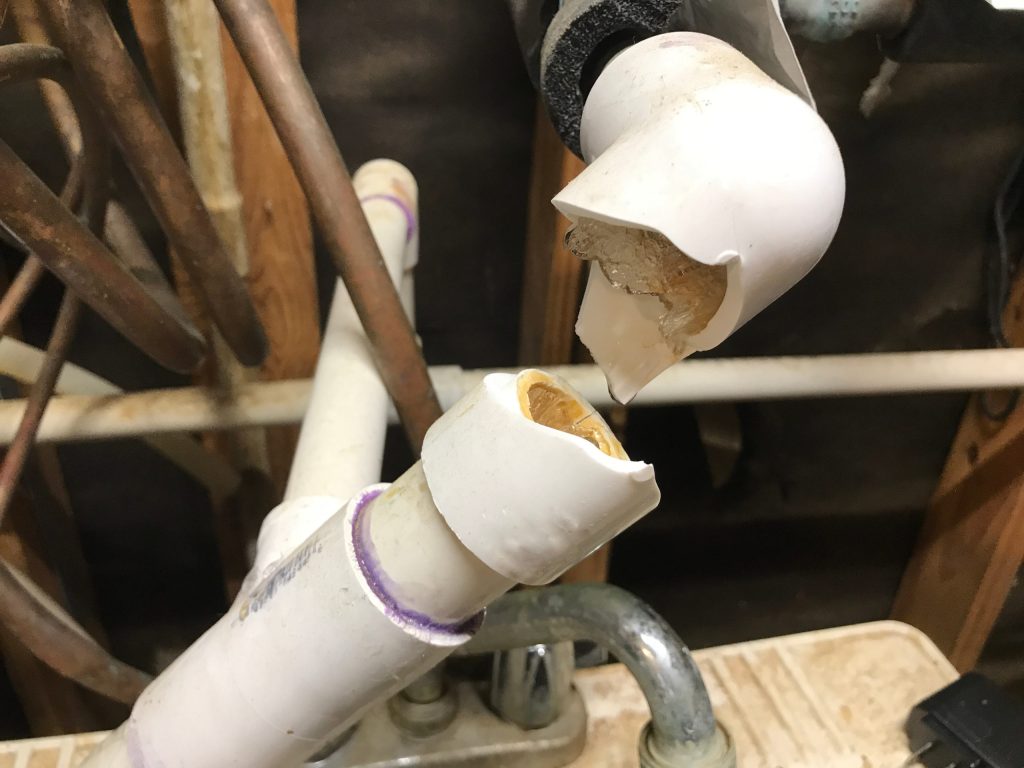How to Prevent Burst Pipes

Burst pipes are a nightmare for any homeowner or business owner. Not only can they cause extensive damage, but the cleanup can also be challenging due to cold weather. Most burst pipes are caused by frozen pipes. Here’s how to prevent burst pipes during Alberta’s cold winters.
1. Ensure pipes are properly insulated.
Insulation is important for keeping the heat in your home or building. However, even with proper insulation, there can be cold spots inside cabinets or because of a faulty furnace. Ensure your home or building is properly insulated. If this has been done or it’s not possible, you can insulate the pipes themselves by using spray-foam insulation or insulation pipe wrap. Focus on exterior walls and unheated areas (and the pipes adjacent to those unheated areas).
2. Properly seal any cracks and holes.
Cracks and holes can let cold air in which can cause pipes to freeze and burst. Inspect your home or building’s exterior and interior and repair them if you spot any issues. You should also ensure the doors and windows have weather stripping in good repair.
3. Keep doors and windows closed.
The colder it is outside, the more impact an open door or window can have on the temperature of your home. If it’s too warm, turn your thermostat down a bit. If you need circulation, use a fan.
4. Drain and winterize outdoor pipes.
Disconnect and drain all exterior hoses and other fittings. Shut off the valve for exterior spigots and drain the exterior faucets by turning them on and letting the water drain out – turn them off after a few hours. You should also winterize any irrigation systems.
5. Keep your home or building adequately heated.
A furnace or heating system that has been turned off or has failed is the biggest culprit behind burst pipes. Make sure to keep your heat on and maintain a temperature of at least 14 C inside – keep in mind that exterior walls and certain areas may be colder! Some buildings may require higher temperatures.
Proper maintenance of your heating system is important. Change your filter regularly (every one to three months) and have a professional inspect it once a year.
6. Keep water moving if your heat fails.
If your heating system fails or it is struggling to keep up with the cold weather, keep water moving through your pipes by turning the interior faucets to drip or trickle. This keeps water moving through the system and helps prevent it from freezing.
7. If your business will be closed or you will be away from home, you should arrange for someone to check on it and consider turning off the water.
Insurance companies may require a responsible adult to check on your home or building every 24 to 48 hours for a claim to be covered. This is because the longer damage goes unnoticed, the worse it gets. Check with your insurance broker before you leave to find out what your insurer requires.
Turning off your water and draining the pipes (by leaving faucets open for a while before turning them off) helps prevent frozen and burst pipes.
What happens if your pipes burst?
While burst pipes are normally covered under business property or home, condo and tenant insurance, it’s always better to avoid the damage in the first place.
If you do have a burst pipe, turn off the water immediately (you may also need to shut off the power). Contact your insurer to start a claim and document the damage: take photos and video to record what happened. You should write down the details such as the date, time and exactly what happened. Don’t forget to make a list of what was damaged or destroyed.
If it is safe to do so, remove items from the water and dry them. You may also be able to start removing water and drying out your home. Your insurer can recommend a restoration company, so follow their instructions (or those from your insurer). Don’t forget to keep all receipts for cleanup costs and any replacement items.
Speak to your broker if you plan to be away over the winter months and to understand your coverage when it comes to burst pipes.



